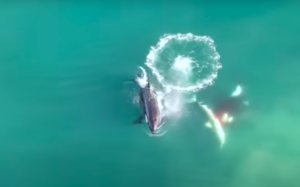
VIDEO: Drone footage shows orcas killing great white shark

Evidence that orcas hunt great white sharks has been published. In a scientific study, a pod of killer whales was seen chasing sharks during a hour-long pursuit off Mossel Bay, South Africa.
“This behaviour has never been witnessed in detail before, and certainly never from the air,” says Alison Towner, a shark scientist at Marine Dynamics Academy in Gansbaai.
The footage shows five orcas chasing and killing a great white shark.
“Killer whales are highly intelligent and social animals. Their group hunting methods make them incredibly effective predators,” says Simon Elwen, the study’s co-author.
Sharks disappeared from the area after the attack, with only one great white spotted in the next 45 days, according to the paper, which was published in the journal Ecology. The authors say this confirms sharks have a flight response.
The presence of the orcas – two of whom are known as Port and Starboard by scientists – has been linked with eight great white shark carcasses washing up on the country’s shoreline since 2017. Since the attacks began, great whites appear to be avoiding the area around Gansbaai, which has been a tourist hotspot for seeing the predatory fish, according to NHM.
The orcas behaviour is thought to be affecting the marine ecosystem. “With no great white sharks restricting cape fur seal behaviour, the seals can predate on endangered African penguins or compete for the small pelagic fish they eat,” says Towner.
Knock-on effects in an eco-system for the other groups is known as a trophic cascade.
“It has triggered the emergence of a new mesopredator (a predator in the middle of a food chain) known as the bronze whaler shark to the area which are known to be eaten by the great white shark,” Towner says. “These bronze whalers are also being attacked by the orcas too, who are indicating a level of experience and skill in hunting large sharks.
“There is only so much pressure an ecosystem can take, and the impacts of these orca removing sharks are likely far reaching.”
In October 2020 a group of scientists claimed attacks on boats by orcas off the north-western Spanish coast were carried out by two or three younger whales who likely felt threatened by the larger vessels. Alfredo López, a biology professor, said the animals were taking “precautionary” steps to protect themselves after a Scottish yacht owner described how his boat was attacked by three orcas. A sailor from New Milton, Hampshire said he felt he was “caught up in a horror film” when a pod of 30 orca whales repeatedly attacked the yacht he was crewing on during the following summer (July 2021).
